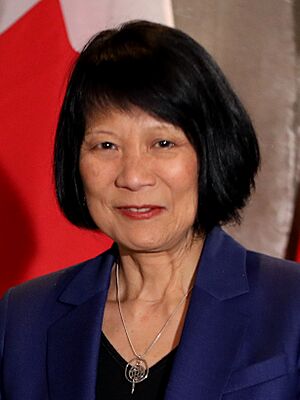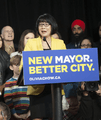Olivia Chow facts for kids
Quick facts for kids
Her Worship
Olivia Chow
|
|||||||||||||||
|---|---|---|---|---|---|---|---|---|---|---|---|---|---|---|---|
|
鄒至蕙
|
|||||||||||||||

Chow in 2024
|
|||||||||||||||
| 66th Mayor of Toronto | |||||||||||||||
| Assumed office July 12, 2023 |
|||||||||||||||
| Deputy | Jennifer McKelvie Ausma Malik |
||||||||||||||
| Preceded by | John Tory | ||||||||||||||
| Member of Parliament for Trinity—Spadina |
|||||||||||||||
| In office January 23, 2006 – March 12, 2014 |
|||||||||||||||
| Preceded by | Tony Ianno | ||||||||||||||
| Succeeded by | Adam Vaughan | ||||||||||||||
| Toronto City Councillor for Ward 20 Trinity—Spadina (Ward 24 Downtown; 1992–2000) |
|||||||||||||||
| In office January 1, 1992 – November 28, 2006 |
|||||||||||||||
| Preceded by | Dale Martin | ||||||||||||||
| Succeeded by | Martin Silva (2006) | ||||||||||||||
| Other roles | |||||||||||||||
| 1985–1991 | Toronto Board of Education Trustee | ||||||||||||||
| Personal details | |||||||||||||||
| Born | March 24, 1957 British Hong Kong |
||||||||||||||
| Nationality | Canadian | ||||||||||||||
| Political party | Independent | ||||||||||||||
| Other political affiliations |
New Democratic | ||||||||||||||
| Spouse | |||||||||||||||
| Children | 2 stepchildren, including Mike Layton | ||||||||||||||
| Residences | Toronto, Ontario, Canada | ||||||||||||||
| Alma mater | Ontario College of Art University of Toronto University of Guelph (BA) |
||||||||||||||
| Occupation |
|
||||||||||||||
| Chinese name | |||||||||||||||
| Traditional Chinese | 鄒至蕙 | ||||||||||||||
| Simplified Chinese | 邹至蕙 | ||||||||||||||
|
|||||||||||||||
Olivia Chow (born March 24, 1957) is a Canadian politician. She is the current mayor of Toronto, a role she has held since July 12, 2023. Before becoming mayor, Chow was a Member of Parliament (MP) for Trinity—Spadina from 2006 to 2014. She also served as a Toronto City Councillor from 1992 to 2005.
Born in British Hong Kong, Chow moved to Canada when she was 13. She started her political career in 1985 as a school board trustee in Toronto. She was active in local Toronto politics before being elected to the House of Commons in 2006. Her husband, Jack Layton, was also an MP and leader of the New Democratic Party. Chow stepped down from Parliament in 2014 to run for mayor of Toronto. She was elected mayor in 2023, becoming the first woman to hold this position since Toronto's different parts joined together.
Contents
Early Life and Education
Olivia Chow was born in British Hong Kong. Her mother was a teacher, and her father was a school superintendent. Her family moved to Canada in 1970 when she was 13 years old. They settled in Toronto. Her parents worked hard in various jobs to support the family.
Chow attended Jarvis Collegiate Institute. She studied fine arts at the Ontario College of Art. She also studied philosophy and religion at the University of Toronto. In 1979, she earned a Bachelor of Arts degree in fine art from the University of Guelph. After finishing school, she worked as an artist. She had her own sculpture studio. She also taught at George Brown College for five years.
Early Political Career
Starting in School Boards
Olivia Chow began her political journey in the early 1980s. She worked in the office of a local politician. In November 1985, she was elected as a school board trustee. This meant she helped make decisions for Toronto's schools. She worked to create programs that protected students. She also led the school board's committee on race relations.
Working for the City
Chow became very popular on the school board. In 1991, she was elected to the Metropolitan Toronto Council. This was a big step into city politics. She was re-elected many times to the city council. As a city councillor, Chow worked hard for important issues. She supported programs for people experiencing homelessness. She also championed public transit and sustainable development. She was known for riding her bicycle, decorated with flowers, to Toronto City Hall.
Her husband, Jack Layton, was also a city councillor. They worked together on many city issues. They supported David Miller when he successfully ran for mayor in 2003.
Federal Politics
Becoming a Member of Parliament
In 1997, Olivia Chow ran to become a Member of Parliament (MP). An MP represents a local area in the House of Commons in Ottawa. She ran again in 2004 but did not win. In 2005, she resigned from her city council seat to focus on running for MP.
On January 23, 2006, she won the election for the Trinity—Spadina area. She became an MP for the New Democratic Party. She and her husband, Jack Layton, made history. They were one of the few husband-and-wife teams to serve in the Canadian Parliament at the same time.
Key Work in Parliament
In 2007, Chow supported a motion asking Japan to apologize for a historical issue. The motion passed in Parliament. She also worked on a motion to allow people who objected to certain wars to stay in Canada. This motion gained international attention.
In 2011, Olivia Chow was re-elected as MP. The New Democratic Party became the Official Opposition. This meant they were the main party challenging the government. Chow became the critic for transport and infrastructure. Sadly, her husband, Jack Layton, passed away from cancer just three months later. Chow was in the public eye during this difficult time. She was praised for her strength and dignity. On March 12, 2014, Chow resigned from her seat in Parliament. She decided to run for mayor of Toronto.
Return to Federal Politics (2015)
In 2015, Chow tried to return to federal politics. She ran for MP in a new area called Spadina—Fort York. However, she lost to Adam Vaughan.
Mayoral Campaigns
2014 Mayoral Election
Olivia Chow ran for mayor of Toronto in 2014. She was seen as a strong candidate. Her main focus areas were transit, children, and jobs. She supported building more bus and light rail lines. She also wanted to expand after-school programs for children. She aimed to create job opportunities for young people.
Despite being a favorite early on, she finished third in the election. John Tory won that election.
2023 Mayoral By-election
On April 17, 2023, Chow announced she would run for mayor again. This was a special election after the previous mayor resigned. She spoke out against some provincial government plans for Ontario Place. She also proposed building 25,000 affordable homes on city land. She wanted to increase a tax on empty properties to help fund housing.
For transit, she suggested turning a decommissioned subway line into a busway. She also promised to reverse cuts to the Toronto Transit Commission (TTC). On June 26, 2023, Olivia Chow was elected as the mayor of Toronto. She won with 37.2% of the votes.
Mayor of Toronto
Olivia Chow was sworn in as the 66th mayor of Toronto on July 12, 2023.
Key Appointments
As mayor, Chow can choose who leads different city committees. She appointed Ausma Malik as a new deputy mayor. She also appointed new chairs for important committees like budget, planning, housing, and transit. These changes led to a more progressive approach in city leadership.
City Finances and "New Deal"
When Chow became mayor, Toronto faced a large budget shortfall. She called for a "new deal" for funding the city. She asked the provincial and federal governments for more financial help. In November 2023, Chow and the Premier of Ontario announced an agreement. The province would take over responsibility for major highways in Toronto. They also agreed to provide funding for transit and to help with homelessness. This deal aimed to improve Toronto's financial situation.
2024 and 2025 Budgets
In January 2024, city staff proposed a property tax increase. This was to help cover city expenses. The city council approved a 9.5% property tax increase. This was the largest increase since 1998. Chow also supported converting a decommissioned subway line into a busway. She announced that all 100 Toronto Public Library branches would open seven days a week by July 2026.
For the 2025 budget, Chow proposed a 6.9% tax hike for homeowners. This money would go towards improving city services. She also announced that TTC fares would be frozen for the second year in a row. Toronto is preparing to host matches for the 2026 FIFA World Cup. The city will spend money on hosting the event and upgrading facilities.
Housing Initiatives
Chow has focused on building more affordable homes. In January 2025, she announced a plan with federal and provincial governments. They would provide $975 million to build 14,000 new homes near the Toronto waterfront. The city also plans to build 7,000 new rental homes. In March 2025, the federal government provided $2.25 billion in loans. This money will help build thousands of rental homes, including affordable units.
Renaming City Places
Dundas Street and Square
After her election, Chow supported a plan to rename Dundas Street and other related places. The street was named after Henry Dundas. He was a Scottish politician linked to delaying the end of the slave trade. In December 2023, the city council voted to rename Yonge–Dundas Square to Sankofa Square. "Sankofa" is a word from Ghana that means reflecting on the past. They also voted to rename some subway stations. The renaming of the street itself was put on hold due to costs.
Centennial Park Stadium
Chow also supported renaming Centennial Park Stadium in Etobicoke. In December 2023, the council voted to rename it after former mayor Rob Ford. He passed away in 2016. The stadium was officially renamed Rob Ford Stadium on May 28, 2024. Chow attended the ceremony.
Public Opinion
Soon after taking office, Olivia Chow had a high approval rating. After the 2024 budget with its property tax increase, her approval rating decreased. A year after she became mayor, her approval rating was around 59%.
Outside Politics
After her 2014 mayoral campaign, Olivia Chow became a visiting professor at Toronto Metropolitan University. She focused on community involvement.
In 2014, she published her personal story in a book called My Journey. In 2016, she started the Institute for Change Leaders. This group teaches people skills for political campaigns and community organizing.
Personal Life
Olivia Chow was married to Jack Layton from 1988 until his death in 2011. In 2012, she unveiled a statue dedicated to Layton in Harbour Square Park. Chow is a stepmother to Layton's two children. One of them, Mike Layton, was also a Toronto city councillor.
In 2005, Chow shared that she had surgery for thyroid cancer in 2004. She wanted to raise awareness about the disease. She also speaks Cantonese, Mandarin, and English. She is a fan of Star Trek.
Awards and Honours
In May 2012, Chow was named one of the top 25 Canadian immigrants. She was also voted "Best City Councillor" many times by Toronto newspapers. The Ontario Federation of Labour named an award after her, called the "Olivia Chow Childcare Champion Award."
Images for kids
-
Chow walks to her polling station with her husband Jack Layton, May 2, 2011.
-
Olivia Chow at the Bastille Day 2023 celebration in Toronto.
-
Chow (right) with the President of Ecuador Daniel Noboa (left), March 2024
See also
- Layton family
 | Precious Adams |
 | Lauren Anderson |
 | Janet Collins |









